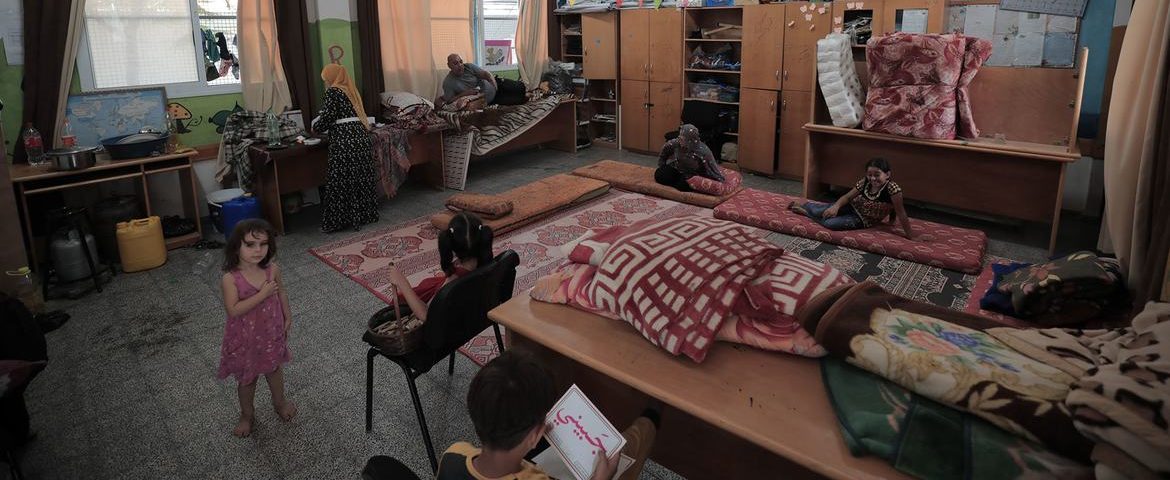UN chief urges immediate action to prevent Israel-Gaza conflict spillover

The UN chief raised alarm over clashes along the Blue Line, the demarcation between Israel and Lebanon, as well as reported attacks from southern Lebanon.
“I appeal to all parties – and those who have an influence over those parties – to avoid any further escalation and spillover,” he told reporters at the UN Headquarters, in New York.
Release Israeli hostages in Gaza
Mr. Guterres reiterated the need to always protect civilians, as guaranteed by international law.
“I call for the immediate release of all Israeli hostages held in Gaza,” he said.
Humanitarian access urgently needed
The UN chief underscored that UN premises, hospitals, schools and clinics must never be targeted, and stressed the urgency of humanitarian access to the enclave.
“Crucial life-saving supplies – including fuel, food and water – must be allowed into Gaza. We need rapid and unimpeded humanitarian access now,” he stated.
Rising death toll
The death toll in Israel from attacks by Palestinian armed groups, and in Gaza due to Israeli bombardments, has continued to rise, with mass displacement soaring across the enclave, the UN humanitarian affairs coordination office, OCHA, said on Wednesday.
OCHA cited Israeli media, which reported that as of Tuesday evening, more than 1,000 Israelis, including foreign nationals, were killed and at least 2,806 people were injured, according to the Ministry of Health.
The Ministry of Health in Gaza said at least 830 Palestinians have been killed and 4,250 injured.
Over a tenth of the population in Gaza, more than 260,000 people, have been displaced since the start of the current conflict on 7 October and the numbers are rising fast.
Eleven UNRWA staff killed
Amidst the volatile situation, UN agency for Palestine refugees (UNRWA) reported that eleven of its staff members have been killed since Saturday, while 30 students its schools died and a further eight injured.
UNRWA is a lifeline for most of the roughly two million Palestine refugees in Gaza, providing essential services such as education and healthcare. The conflict has forced the closure of its 14 food distribution centres as well as a reduction in operations. In addition about 220,000 Palestinians have sought shelter in about 90 UNRWA facilities across the enclave.
UNRWA Director of Communications Juliette Touma told UN News, on Tuesday, that many staff are still working.
“We have people who are responding to the needs of the people in the shelters. They are giving them mattresses, a place to sleep, clean water, some food, in cooperation with the UN World Food Programme (WFP),” she said.
A ‘devastating’ situation
At the same time, UN agencies, including WFP, highlighted the urgency of humanitarian corridors, and safe and unimpeded access passage for personnel.
Samer Abdeljaber, Palestine Country Director, described the situation as “devastating”.
“We are on the ground doing everything we can to be sure the people in need – the ones who fled their homes, the ones living in shelters – are getting the food and help they need to survive.”
In the immediate aftermath of the conflict, WFP initiated food distribution to 100,000 people in UNRWA shelters, with a target of reaching over 800,000, requiring $17.3 million for immediate relief and $45 million over six months.
Political engagement continues
Meanwhile, senior UN officials, including the Special Coordinator for the Middle East Peace Process, Tor Wennesland, continue engagement with parties to the conflict and key stakeholders.
Mr. Wennesland held “productive meetings” on Wednesday with Egyptian Foreign Minister Sameh Shoukry and other senior officials, according to a post on his official account on X, formerly Twitter.
He said the priority is to avoid further loss of civilian lives and provide access for humanitarian aid into Gaza.
In an interview with UN News late on Wednesday, UN humanitarian affairs office (OCHA) official in the enclave, Hamada El Bayari, said there was “not one immune centimetre in Gaza where people can feel secure.”
He said around 340,000 civilians were now displaced, around 65 per cent of them doing their best to shelter from Israeli airstrikes, at UN relief agency (UNRWA) schools or designated shelters.
“What we are witnessing is really beyond imagination. The toll this war is taking is really huge and seems unprecedented.”
With public services shut down by Israel and a near complete blackout, he warned that the the failure of the sewage system was another potential disaster waiting to happen.
At this point of time, every minute that passes, makes it worse”, he said.

